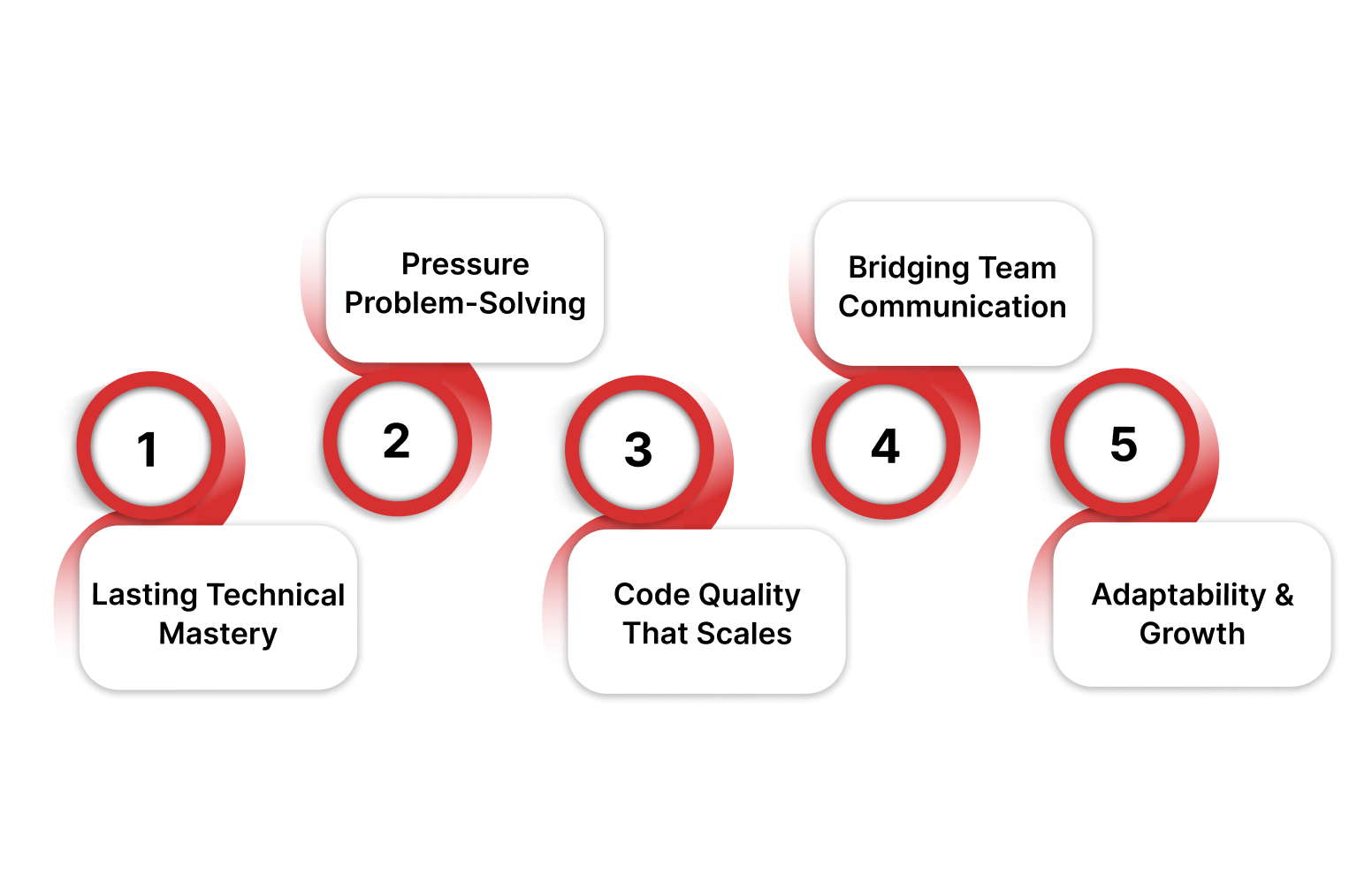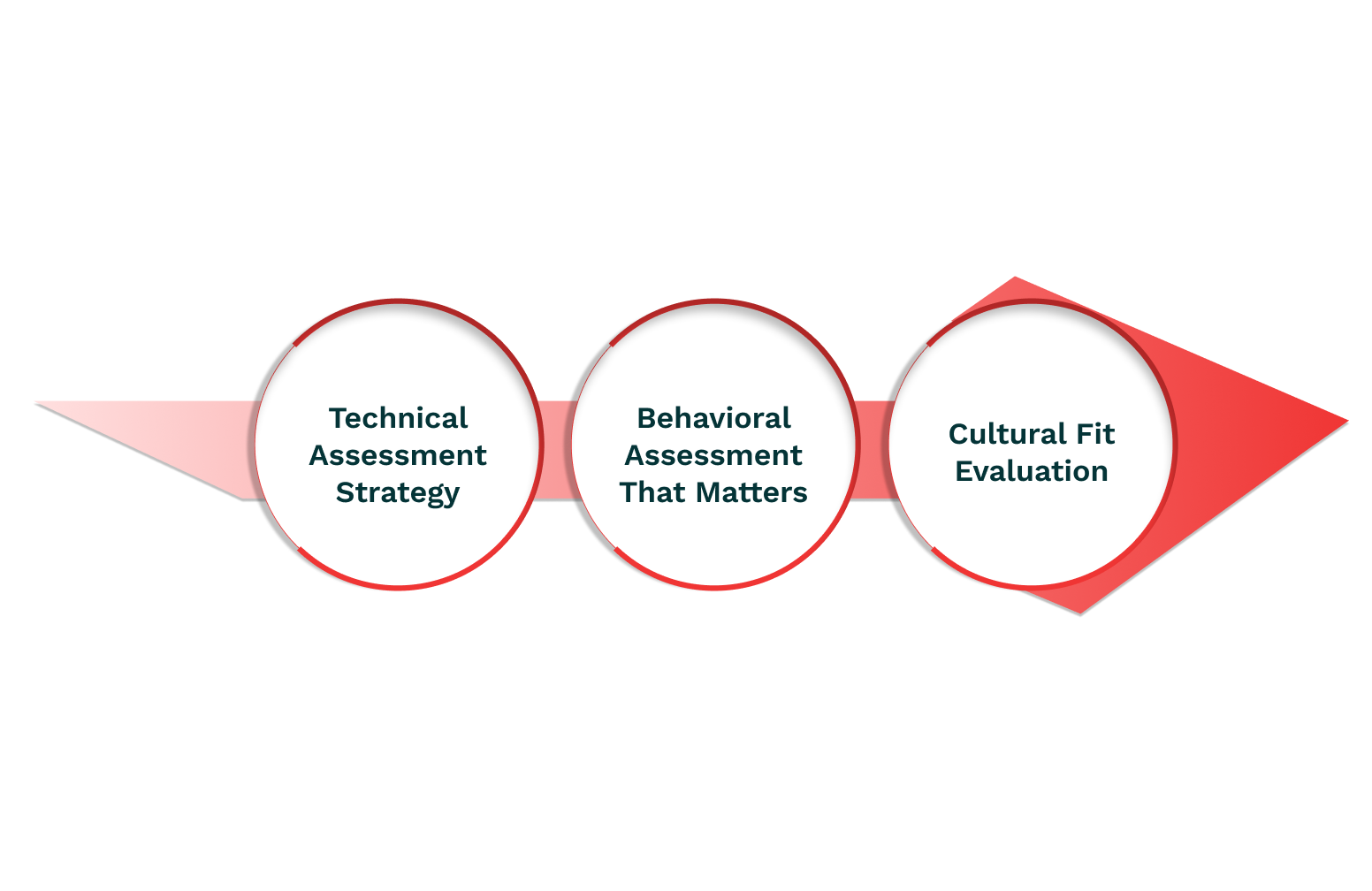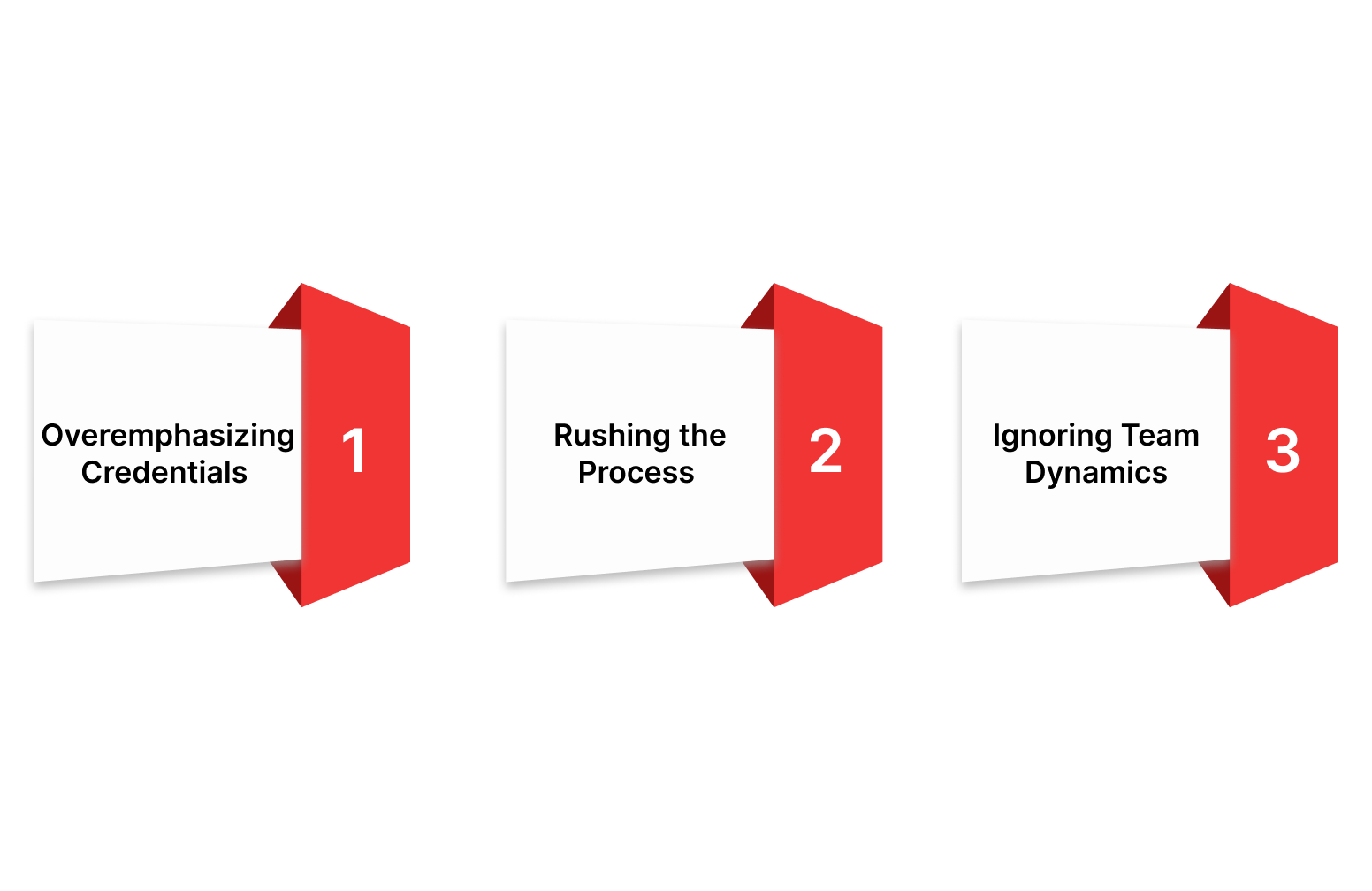TL;DR
- Define clear hiring requirements. Know your tech stack, system requirements, and business objectives before you begin.
- Focus on five key traits: technical expertise, problem-solving ability, scalable code quality, communication, and adaptability.
- Prioritize real-world, practical assessments, such as system design discussions, debugging sessions, and code reviews.
- Value hands-on experience over credentials. Review portfolio projects, Git history, and previous system ownership.
- Spot red flags early, including weak communication, poor code practices, and resistance to feedback or learning.
The difference between a great software developer and an average one can make or break your project timeline. Companies with strong engineering teams are more likely to achieve their business goals, while poor hiring decisions cost organizations an average of $240,000 per bad hire in the tech sector.
Understanding what to look for when hiring a software developer isn't just about technical skills anymore. The present hiring landscape demands a strategic approach that balances technical expertise, cultural alignment, and long-term growth potential.
This blog discusses the essential elements you need to evaluate, from core competencies to interview strategies, helping you build a development team that drives real business results.
Start with Clear Hiring Requirements
Success begins with knowing exactly what you need. Vague job descriptions attract the wrong candidates and waste everyone's time.
Define Your Technical DNA
Before you interview a single candidate, map your exact technical needs:
Core Stack Requirements:
- Primary languages (Python, JavaScript, Go, Rust)
- Frameworks and libraries (React, Vue, Django, FastAPI)
- Database technologies (PostgreSQL, MongoDB, Redis)
- Cloud infrastructure (AWS, GCP, Azure)
Architecture Expertise:
- Microservices vs. monolithic systems
- API design and integration patterns
- DevOps and CI/CD pipeline experience
- Scalability and performance optimization
Early-stage companies need versatile generalists while established enterprises require deep knowledge specialists. Know what you need before you start looking.
Align with Business Impact
The best developers don't just write code; they also solve business problems. Identify whether you need someone to:
- Build MVP products that attract investors
- Scale existing systems for 10x growth
- Modernize legacy infrastructure
- Lead technical architecture decisions
The 5 Critical Areas: What to Look for When Hiring a Software Developer

These five areas separate exceptional developers from average ones. Evaluate your candidates based on these, and you'll never make a bad hire again.
1. Technical Mastery That Goes a Long Way
Test candidates beyond surface knowledge. Anyone can list programming languages on their resume. Elite developers demonstrate their skills:
Proficiency in Core Programming Languages
Evaluate hands-on experience and language-specific best practices. Prioritize candidates with demonstrable knowledge in:
- Frontend: JavaScript, TypeScript, React, Angular, Vue.js
- Backend: Python, Java, Go, C#, Ruby, Rust
- Mobile: Kotlin, Swift, React Native
- Data & AI: Python (for data analysis, AI/ML), R, SQL
This range ensures your team can build full-stack, scalable applications while adapting to evolving project needs.
System Design and Architecture Fundamentals
Top developers think in terms of systems, not isolated features. Ensure they understand:
- Database design and optimization
- Caching strategies (Redis, Memcached)
- Load balancing, fault tolerance, and distributed systems patterns
- API design, versioning, and backward compatibility
Familiarity with Software Development Methodologies
Hands-on experience with Agile, Scrum, and Kanban methodologies is crucial. Developers should:
- Understand iterative development and continuous delivery principles
- Know how to work within sprints, manage backlogs, and participate in standups and retrospectives
This ensures seamless collaboration and predictable delivery timelines.
Problem-Solving and Analytical Abilities
Exceptional developers break down complex issues into manageable parts, applying logical, structured approaches like:
- Root cause analysis
- Decomposition techniques
- Trade-off analysis and impact assessments
Test this by presenting candidates with real production bugs or architecture challenges during interviews.
Proficiency with Version Control and Collaboration Tools
Experience with Git and platforms like GitHub or GitLab is non-negotiable. Developers should demonstrate:
- Clear branching strategies
- Clean commit hygiene
- Code review participation and collaborative debugging workflows
Knowledge of Modern Development Workflows
Expect them to be familiar with:
- Test-Driven Development (TDD) and Behavior-Driven Development (BDD)
- CI/CD pipelines
- Containerization tools (Docker, Kubernetes)
- Infrastructure as Code (Terraform, CloudFormation)
- Observability and monitoring tools (Prometheus, Grafana)
2. Problem-Solving Under Pressure
Present real scenarios from your codebase to the candidates. Exceptional developers will:
- Ask clarifying questions before coding
- Break complex problems into logical components
- Propose multiple solutions with trade-off analysis
- Debug systematically rather than randomly
Red Flag: Candidates who jump straight to coding without understanding requirements.
3. Code Quality That Scales
Review their GitHub repositories and portfolio projects. Here's what you should look for:
- Clean Code: Meaningful names, single responsibility functions, clear documentation
- Testing Coverage: Unit tests, integration tests, end-to-end testing
- Git Hygiene: Atomic commits, clear messages, proper branching strategies
- Performance Awareness: Optimized algorithms, efficient database queries
Struggling to find developers who check all these boxes? Tap into Consultadd's pre-vetted talent pool of 200+ verified developers skilled in AI/ML Full-Stack, Cloud, and DevOps. Start hiring smarter today! Schedule a free talent discovery call with our team.
4. Communication That Bridges Teams
Technical brilliance means nothing if software developers can't collaborate effectively. Strong candidates will:
- Explain complex concepts in simple terms
- Write clear technical documentation
- Participate constructively in code reviews
- Handle feedback without defensiveness
5. Growth Mindset and Adaptability
Technology evolves rapidly. You need a team that is ready to work in changing environments. The best developers:
- Learn new frameworks and languages quickly
- Contribute to open-source projects
- Stay current with industry trends
- Embrace changing requirements as opportunities
Your Interview Process: Beyond the Whiteboard

Traditional coding interviews fail to predict real-world performance. Here's how to assess candidates in terms of how they'll work.
Technical Assessment Strategy
Skip the puzzles, focus on reality. Instead of abstract algorithms, use scenarios from your actual codebase to test the candidates:
- Code review exercises with real pull requests
- Architecture discussions about scaling challenges
- Debugging sessions with production issues
- Pair programming on feature implementations
System design requirements for all levels. Even junior developers should understand basic system concepts:
- How does a web request travel through your stack?
- What happens when your database becomes a bottleneck?
- How would you handle a 5x traffic spike?
Behavioral Assessment That Matters
Use the STAR method to explore:
- Situation: "Tell me about a time you disagreed with a technical decision."
- Task: "What was your role in resolving it?"
- Action: "What specific steps did you take?"
- Result: "What was the outcome and what did you learn?"
Cultural Fit Evaluation
Understanding what to look for when hiring a software developer includes cultural alignment. Ask questions that clarify the following:
- Do they share your company's values?
- Are they excited about your problem domain?
- How do they handle stress and tight deadlines?
- Do they mentor others and share knowledge?
Fast-track your hiring process without cutting corners. Consultadd handles technical assessments, background checks, visa support, and payroll management so you get fully trained, ready-to-deploy developers faster. Explore our immediately available core talent pool now.
Developer Red Flags That May Cost You Later
These warning signs predict future problems. Recognizing them early saves months of frustration and expensive turnover.
Technical Red Flags:
- Can't explain their code from GitHub
- Defensiveness about code quality feedback
- Inability to discuss trade-offs in technical decisions
- Overengineering simple solutions
Cultural Red Flags:
- Blames others for project failures
- Shows no curiosity about your business
- Poor communication during technical discussions
- Unwillingness to learn new technologies
Choosing Your Hiring Strategy
Different situations require different approaches. Match your hiring model to your specific needs and timeline constraints.
Moreover, connecting with specialized recruitment partners can streamline this decision-making process, offering access to pre-vetted talent pools without the overhead of traditional recruitment cycles.
Avoid These Costly Hiring Mistakes

Even experienced hiring managers fall into these traps. Learn from others' expensive errors instead of making them yourself.
- Overemphasizing Credentials
A computer science degree doesn't guarantee coding ability. Focus on demonstrated skills through portfolio review and practical assessments.
- Rushing the Process
Taking shortcuts in evaluation leads to expensive turnover. Invest time upfront to avoid 6-month disasters.
- Ignoring Team Dynamics
Technical skills matter, but team chemistry determines long-term success. Involve your existing developers in the interview process.
Companies that excel at what to look for when hiring a software developer share standard practices:
- They assess practical skills over theoretical knowledge
- They evaluate cultural fit alongside technical ability
- They invest in thorough, multi-stage interview processes
- They prioritize problem-solving ability over resume keywords
The difference between good and great developers isn't just technical; it's their ability to understand business context, collaborate effectively, and adapt to changing requirements.
The best companies avoid mistakes and follow proven hiring practices that deliver long-term business value.
Conclusion
Knowing what to look for when hiring a software developer requires balancing technical expertise, problem-solving abilities, and cultural alignment. The most successful hires combine deep technical skills, strong communication abilities, and growth mindsets, contributing to long-term team success.
Your hiring process should be structured, comprehensive, and aligned with your business objectives. Take time to define precise requirements, use practical assessment methods, and avoid common pitfalls that lead to costly mis-hires.
Finding the right software developers requires expertise, time, and access to quality talent pools that many companies struggle to maintain internally. With 13 years of experience and over 5,000 successful engagements, Consultadd becomes your behind-the-scenes tech talent partner, specializing in Full-Stack Development, Cloud Technology, and DevOps hiring.
What makes Consultadd different:
- Pre-vetted talent pool - Access 200+ professionals with comprehensive verification, including technical assessments, background checks, and reference validation
- Ready-to-hire candidates - 60+ core talent pool of immediately available, highly skilled developers who've passed rigorous evaluation processes
- Complete hiring support - We handle interview coordination, visa compliance, payroll, benefits administration, and ongoing candidate monitoring.
- Extension of your team - Dedicated account management and customized solutions that adapt to your specific requirements and growth stage
Transform your developer hiring process and access top-tier technical talent without the traditional delays and complications. Contact Conusltadd today →
Frequently Asked Questions (FAQs)
Q1. What are the most in-demand programming languages for software developers in 2025?
In 2025, the most sought-after programming languages include Python, JavaScript, TypeScript, Go, Rust, and Java. For frontend development, React, Angular, and Vue.js lead the market, while Python dominates roles in AI, data science, and the backend. Kotlin and Swift remain top choices for mobile development.
Q2. How can I effectively assess a software developer's problem-solving skills during an interview?
Present candidates with real production issues or architecture challenges from your codebase. Ask them to explain their approach, reasoning, trade-offs, and debugging process before writing code.
Q3. Why is cultural fit important when hiring software developers?
Cultural fit ensures developers align with your company's values, communication style, and work culture. It directly impacts team collaboration, retention, and long-term project success.
Q4. What technical assessment methods work better than coding puzzles?
Replace abstract puzzles with code review exercises, system design discussions, real debugging sessions, and pair programming challenges using your actual tech stack.
Q5. Should I prioritize full-time developers, contractors, or staffing partners for my project?
It depends on your project timeline, technical complexity, and budget. Full-time hires suit core product development, contractors handle short-term specialist work, and staffing partners help you scale quickly with pre-vetted talent.
Q6. What are common red flags to watch for when hiring developers?
Be cautious of candidates who can't explain their past code, resist feedback, overengineer simple solutions, blame others for issues, or show no curiosity about your business.

